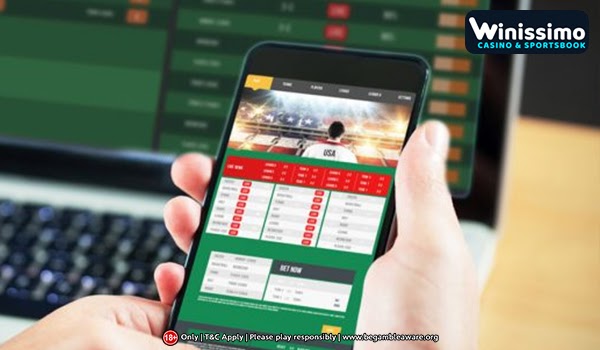Sports betting has been going on for centuries. For as long as there have been people playing sports, there have also been people betting on them. The reasons for people to bet on sports are always the same. Betting on sports is fun and there is a chance of winning money. Of course, it wasn’t always quite as easy to get your money down as it is today. We didn’t have the option to bet online. Thankfully, these days we all have access to top betting sites. Sports betting can easily be defined as one of the most widely-spread forms of gambling. In general terms, it is about placing a wager, commonly referred to as a bet, on the outcome of a particular sports event. The face of this phenomenon has changed a lot since its introduction in the mainstream market. Many major entertainment companies and the leagues themselves are now teaming up to create platforms that are allowing new levels of profit from popular sports. But the game is already changing even more as technology is transforming the way bets are placed and who is placing them.

Changes for Legal Betting Industry
It will power a renewed drive towards online and mobile-based wagering which will have far-reaching implications for all concerned. I believe that there will be a material change to the gaming industry, with a hard shift towards online and mobile. States will need revenues, the industry can provide jobs, and sports fans are going to find ways to engage with their favourite sports, teams and players.” Winissimo offers personalized live-odds competitions that engage sports bettors of all experience levels.
Product Innovation
While offering generous promotions and more favourable odds are common ways in which B2C operators compete for market share (i.e. “competing on price”), the hope is that product innovation, which benefits consumers by way of enhanced user experience, drives a great deal of future retention in the betting market.
Placing a Bet on portable devices
Previously, bets on sporting events had to be made in person at a legal gaming facility. Now relevant platforms are there which can be accessed on a phone or tablet, bringing an entirely new audience to this type of gambling, most noticeably women and millennials. This is also helping novice bettors to learn more about sports betting strategy.
A gain in speed and structure
The speed of betting platforms and a higher level of detail in player and game data is causing an uptick in in-game betting, where fans can bet on the outcome of specific plays as opposed to the game itself. Football is one of the most popular sports for this kind of betting due to the natural pauses in the game. This is why online football betting is very popular among people. However, we expect this to continue expanding into other sports and types of bets like cricket betting also, as the technology continues to advance.
Technological advancement
Wearable technology would allow fans to base their bets and fantasy team lineups on real-time performance indicators. While this could be a boon for the industry, it raises some serious privacy concerns for the athletes that could spill over into an athlete’s ability to negotiate a contract or endorsement deal. We expect to see state regulation around performance data as the next evolution in sports law.

Peer-to-Peer
Peer-to-peer wagering, whether by way of the conventional betting exchanges or by some other mechanism, is certainly the wave of the future, though there is a very uncertain path that connects now to then. For one, there is The Wire Act in the US prohibits the transmission of money or information across state lines to facilitate a wager. This prevents a customer in one state from being permitted to place a wager with a customer in another state, even if both of those states allow online gambling.
Increase in Micro Betting
Micro betting describes wagering on short-duration events that are easy to follow. It is expected that wagering on upcoming, individual at-bat outcomes in MLB games will be quite popular in the near-term. While this format requires advanced modelling and is easier to deploy under a Free-to-Play or lottery model, the intuition is that a lot of new customers’ invaluable user bases could be won over by the first movers to properly thread this needle.
Content & Engagement
Sports betting strategy is one of the most potent drivers of engagement in the entire entertainment industry. Emerging platforms are creating new, scalable revenue streams and mechanisms that capitalize on this fact. In the future, this trend will increase creating a seamless shift to the OTT platforms.
Financial Productization
“Financial Productization” refers to the rise in mechanisms for wagering on and engaging with sporting events that more closely resemble investment vehicles and platforms than traditional sportsbooks.
Increase in Lottery Games Mechanism Usage
Lottery games are generally ones in which 100% of the outcome is attributable to chance and none to skill. They typically utilize RNGs to bring perfect parity to the playing field and negate any possibility for a sharp edge. There is a growing interest in applying lottery mechanics to the sportsbook industry because the model is much lower-lift from a consumer perspective and facilitates the acquisition, while also mitigating risk and offering more predictable revenue streams for operators.
Social Betting & Gamification
For many users, this act is less about profitability and more about camaraderie and competition. “Smack talk culture” is alive and well in the UK sports betting arena. The opportunity to digitally connect fans through the betting market will not only drive high-octane engagement but also allow stakeholders to monetize some of the pent up demand.
Conclusion
With that much money at stake, we can expect to see regulations continue to evolve on everything from earning avenues for college athletes to individual state rules on who can facilitate bets, and the use of technology in predicting individual performance. There are times of incredible growth ahead of the sports betting strategy industry. There is also a complicated web of factors representing simultaneous opportunity and challenge for stakeholders. Technology is a critical part of the puzzle, but not the entire thing. It will require incredibly strategic thinking to properly import learnings and assets from established markets while also giving adequate deference to the uniqueness and plasticity of the gambling landscape.
